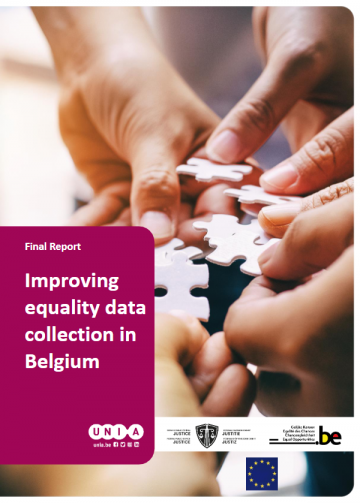Data on discrimination and (in)equality: project equality data
Looking for data on discrimination and (in)equality? Unia has developed a database comprising all sources of equality data in Belgium. Select discrimination criteria and domains and immediately discover the available data sources. The 'Improving equality data collection in Belgium (IEDCB)' project is based on the guidelines of the European Commission High-level group on Non-discrimination, Equality and Diversity's Subgroup on Equality Data.
What is equality data?
Equality data describes and analyses equality and/or inequality. It can be both quantitative and qualitative data. Examples include official figures (censuses, administrative database), surveys, victims' surveys, complaints or reports, discrimination tests, diversity monitoring and qualitative research.
Why is equality data important?
To better fight discrimination and inequality, equality data is essential for getting a more accurate picture of reality. With accurate and complete data, you can identify and solve problems using policies based on facts rather than intuition.
What kind of discrimination and inequality data does it include?
The data hub equality data was developed in the first phase (2020-2021). It gathers all data sources in Belgium on the following 3 discrimination criteria groups:
- so-called "racial" criteria: so-called "race", skin colour, nationality, ancestry and national or ethnic origin
- religion and beliefs
- sexual orientation, gender identity, gender expression and gender characteristics
The final report on 'Improving equality data collection in Belgium (IEDCB)' summarises this first phase of the project. It includes data source gaps and recommendations.
The second phase of the IEDCB project started in early 2023. Its aim: To expand the data hub to include the criteria of disability, physical characteristics and health status. The research team is currently surveying and gathering information through:
- meetings with Advisory committees
- surveys
- interviews of experts
By mid-2024, the data hub will also include data sources for these criteria. The sources for discrimination criteria from the first phase will also be updated during this phase.
Who are the 'Improving equality data collection in Belgium (IEDCB)' project partners?
Both phases were implemented in partnership by the Equal Opportunities Team (FPS Justice) and Unia. The first phase was co-funded by the European Commission's Rights, Equality and Citizenship (REC) programme and the second phase was funded by the Equal Opportunities Team (FPS Justice).

